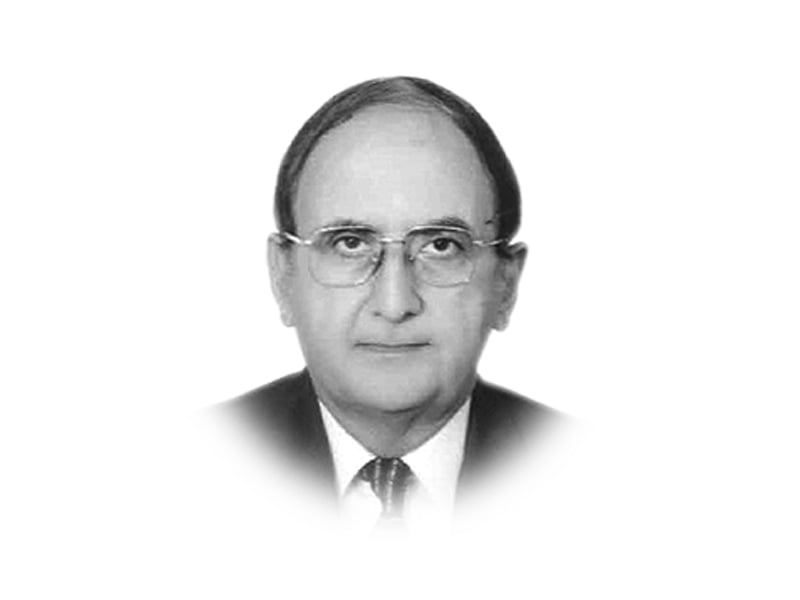
The official civilian version on the meetings between the top military and civilian leaders projects a strong harmony and understanding between them. If we go by the statements of hardline federal cabinet members who have close access to Nawaz Sharif, the impression is created that the army top command fully endorses the civilian government’s management of talks with the TTP and the “high treason” case against Pervez Musharraf. It is not clear if that perception reflects the full reality or the civilian leadership is interpreting the politeness and professional discreetness of the top brass of the army as their total agreement with their handling of these two matters.
The experience of Nawaz Sharif’s earlier terms in office (1990-1993, 1997-1999) shows that Nawaz Sharif and his close associates overestimated their electoral clout in dealing with the military. In January 1993, differences developed between Prime Minister Nawaz Sharif and President Ghulam Ishaq Khan on the selection of the army chief after General Asif Nawaz Janjua died of a heart attack. Nawaz Sharif’s famous speech of not accepting anybody’s dictates in April ultimately brought him in conflict with the army top leadership when it worked towards seeking the resignations of Nawaz Sharif and Ishaq Khan to break the political deadlock in July 1993. Another example of poor management of civil-military relations is Nawaz Sharif’s interaction with the army top brass in the post-Kargil period, especially in August-October 1999. Shahbaz Sharif went to Washington to obtain American support for democracy. This support could not secure civilian rule as Nawaz Sharif attempted to remove General Pervez Musharraf in a dramatic manner and appointed his protégé as the army chief.
The civilian leadership can secure itself against military intrusions by creating a credible civilian governance system that enjoys widespread popular support. This is only possible if electoral legitimacy is coupled with performance legitimacy by good governance and a moderate and accommodating political management.
If the ultimate sanction of the military’s clout is its organisation, discipline and control of instruments of violence, the civilian leaders derive strength from popular support. However, popular support cannot be cultivated without performing in three major civilian domains. First, good governance and delivery of services to the common people and keeping economic pressures on them under check.
Second, an accommodating and cooperative interaction with the out-of-power political and societal forces. What matters here is how far other political and societal forces are willing to support the government at the operational level. If the government establishes a tyranny of majority and keeps all political adversaries under check, the political environment cannot stay harmonious and cooperative over a long period of time. Divided and fragmented political forces cannot command the political system vis-à-vis the military.
Third, post-military rule, political forces need not create a sense of insecurity in the military. An unnecessarily critical posture or negative campaign by the civilian government and political forces is always counterproductive. The civilian government often loses the confidence of the military by a policy of non-accommodation towards the sensitivities of the military top brass or undertaking a persistent propaganda campaign against the military for one reason or another.
In a country like Pakistan, where internal and external security pressures are intense, the military cannot be pushed to the sidelines. Civilian leaders will have to change Pakistan’s internal security profile and build peace on its borders in order to cut back on the role and status of the military.If Pakistan continues to suffer from violence and terrorism and its ultranationalists want to wage war against India, dominate Afghanistan and keep Iran under pressure, the military and its needs and requirements will override other considerations influencing policymaking and its execution.
At a time when the “performance legitimacy” of the PML-N government has slipped downwards, it has embarked on two extremely contentious policies: talks with the TTP and the trial of Pervez Musharraf for “high treason”. The talks with the Taliban in an apologetic manner cannot go on for an indefinite period. The civil government will have to produce positive results by the end of April in terms of the TTP giving up violence and agreeing to work within the framework of the Constitution. The army cannot afford to let the summer of 2014 pass by and let the Taliban consolidate their position in the tribal areas. This will increase the cost of defending Pakistan’s security for the military in 2015.
Similarly, the dragging-on of the Musharraf trial has a strong potential to adversely affect civil-military relations to the disadvantage of Nawaz Sharif. The military expresses its views in its own way, which can be read only by those who understand how a professional and disciplined military works. Given the military’s professional profile and tradition of respect for its retired senior officers, it would be very unusual if the military abandons Pervez Musharraf in favour of political leaders.
The civilian government needs to undertake a dispassionate review of its policies on both issues. Stepping back on these issues may subject the civilian government to criticism by a section of political leaders. However, the cost is likely to be higher for sleepwalking into the Taliban trap in the name of dialogue and settling old scores with Musharraf.
Published in The Express Tribune, April 7th, 2014.
Like Opinion & Editorial on Facebook, follow @ETOpEd on Twitter to receive all updates on all our daily pieces.
COMMENTS (23)
Comments are moderated and generally will be posted if they are on-topic and not abusive.
For more information, please see our Comments FAQ



1731655243-0/BeFunky-collage-(61)1731655243-0-165x106.webp)








@Mohammad: Performance of the civilian govt is none of Army’s business and it is no justification for their repeated treason with this motherland, rather, its only the people of Pakistan who have to evaluate the same. now that is great justification to indulge in corruption
@Mohammad: Performance of the civilian govt is none of Army’s business and it is no justification for their repeated treason with this motherland, rather, its only the people of Pakistan who have to evaluate the same. now that is some evaluation.
The author is a perfect example of INTELLECTUAL DISHONESTY, since, he is a learned person and knows the factual realities but has expressed opinions otherwise (may be he has received an envelope from aabpara). We Pakistanis should and will make no mistakes in creating/establishing rule of law in this country, come what may! All the institutions of the state are bound to work within their constitutional framework and boundaries without any exception or holy cows. Law of the state will take its course regardless of who thinks what or who feels demoralized or frustrated. Performance of the civilian govt is none of Army's business and it is no justification for their repeated treason with this motherland, rather, its only the people of Pakistan who have to evaluate the same.
@Aman: A big sigh of relief to see people like you on this forum. You nailed it!
@Cheema: It will never happen Insha ALLAH, Pakistan has changed and to your utmost disappointment, surprise, and grief, now there will be no more next phase of boots... The whole of civil society is with their legitimately elected leadership, apart from a very few sad exceptions and now we will make sure that the traitors and tried and executed...
'What we learn from history is that we don't learn from history". Irony of fate for us. National Interests should be of prime concern and if its perceived like that, i am sure nothing would ever seem of some consequence, whether it is muscle flexing in face of Military, settling of personal vengeance or attending to own insecurities. Whenever our esteemed Prime Minister is in power i get those illusions that 'He would do something for Pakistan" but much am i disappointed, always. People who wish to make difference, they do not get entangled in ordinary things, they remain focused and leave trivial things for attention at some other time.....or may be, never at all.
@adnan: Had Nawaz Sharif not butted in and instigated the trial, he could have stayed away from it. Now NS is neck deep into this mess and his vindictive agenda is clearly coming across for all to see. Unfortunately the third time is not a charm for someone who does not learn from his mistakes the first time around.
Nawaz Sharif and Imran Khan together make for the most immature set of leaders; oh God, I cringe calling them leaders...
There is a long litany of what civilians must and must not do. But not a single thing that the military may also do for happy coexistence. Yes, that's realpolitik.
Another realpolitik is also true that the Military is 'allowing' civilians to rule in limited ways not because they like civilians but because political climate inside and outside the country is just not conducive to military rule at this particular time. The moment the military finds they can force themselves back into power, they will find or create the 'right' reasons to do so. Having civilians as good little boys has never stopped them from committing the aggression of grabbing power.
Nonetheless, Mr. Askari is right. Good governance and being faithful to their constituents is the best thing the civilians can do for the good of their own class and that of the country.
Not prosecuting Musharraf can be good for not wasting limited political resources and not indulging in diversions. But Mr. Askari does not even pretend to make any political and legal arguments why Musharraf trial is otherwise a bad idea necessarily. Disapproval of disgruntled big boys in barracks is awful reason not to try Musharraf.
@Waseem: With clueless ignoramus like you mouthing off, the problem is further compounded. I am pretty sure the learned scholar, Dr. Rizvi, has more knowledge of the subject than you who seems to be too busy hurling insults at the eminent scholar's opinion.
The new Army General's statement today about the integrity of the army is the most reassuring thing that has happened since the fiasco of charging President Musharaf for high treason. This obscene and ludicrous state of affairs has made us the laughing stock of the world. This is not just a diabolic insult to a man who put his life on line for the nation but also for the army and and the nation as a whole. It gets even worse when you think that a government which is presiding over the death of hundreds of babies due to gross criminal negligence is the very government who is bringing these charges, as of yet no one has been charged for the wholesale murder of those innocent and helpless babies?...... WHY? I for one felt more secure with Musharaf in charge than the two presiding governments. I also think it would be a good idea to conduct a poll to see which person the people would like to see run the country. The result would be a forgone conclusion and no surprise to anyone. Basharat Mughal
Well written piece. Here the author has tried to highlight the quandary in which all Pakistani governments find themselves. Civilian governments' economic performance is always below par basically because historically they have always been corrupt and play dirty politics. However, there are strategies they have been reluctant or unable to implement (or design). The basic problem for Pakistan is its India sized ego promoted by civilians and the people in the country. That meant an India sized armed forces. That in turn allows the army to dictate and demand (high proportion of the national budget) through coercion and demonstrate its power though frequent take overs at the centre. The civilians must understand the ground realities and move forward and take the country with them. For that they must settle with India making minor adjustments (sooner or later that is how it is bound to happen) thereby gradually reducing the size of the armed forces to benefit the populace through peace dividend. That will enable the elected people to perform and alleviate the desire (Excuse) for the armed forces to intervene. Settling with India will also ensure peace in FATA, SWAT and Balouchistan. Absent the foregoing, status quo will prevail for another 100 years.
Always good to read you.......clearly spelt out and sensibly advised.
Perhaps the author should concentrate on finding solutions to Karachi, rather than blaming everything on Nawaz. Oh I like to mention that the articles he writes are so biased, perhaps he didn't receive envelopes as with the previous government.
@Waseem:
Politicians are rogue not the army, Mr.He should not challange the army ( institution) and should deliver for the people of Pakistan.
Nawaz sharif's first 2 terms were characterized by maglomania and hubris. The leopard has not changed its spots.
@shahid: "Rest assured, Mr.nawaz sharif has not learned from his previous experiences." . He wants even you to forget his bombast that the begging bowl was broken. He went to the IMF and later the Saudis with the same pieced together bowl.
Rest assured, Mr.nawaz sharif has not learned from his previous experiences.
Well argumented. Balanced approach is presented by DR. Rizvi.The current regime must understand the sensitivity of eneviornment.Balanaceed civil-military relationship can work in Pakistan if ,as noted by the author, civilian leadership performs well. One more thing, civilin authoritative behavior in power has always failed in Pakistan it should be avoided.
The biggest problem facing Pakistan is feudalism.
It must be rooted out.
A very factual analysis.
Very well written piece Askari SB BUT we are dealing with people in 'leadership' who's biggest achievement has been getting rich by using politics as a vehicle. This whole charade is for 1% of population. Sorry to say but when next phase of boots come, and its only matter of time, most of the population will not care one bit about these rulers.